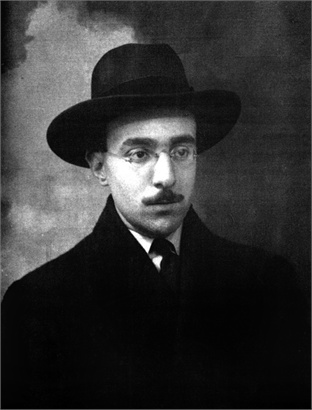Fernando Pessoa (June 13, 1888 - November 30, 1935)

Although his sexuality cannot be documented, Fernando Pessoa, the greatest Portuguese poet since Vaz de Camoes in the Renaissance, wrote homoerotic verse, much of it in English.
Pessoa established Modernism in Portugal and deeply influenced the language. It is said that even Lisbon chamber maids speak differently from their grandparents because of him. He was born (on June 13, 1888) and died (on November 30, 1935) in Lisbon, but grew up in Natal, South Africa, where he had an English education, attending the University of Cape of Good Hope, Capetown. At fifteen, he published a number of virtuosic English sonnets modeled on Shakespeare's.
In 1905, he returned to Portugal, where for the rest of his life he earned his living as a business correspondent (writing letters for export companies in foreign languages) and was also a habitué of literary cafes. He was briefly connected with the nationalist movement in poetry called saudosismo and edited two short-lived journals.
Like his near contemporary Langston Hughes in the United States, he was essentially a reclusive, though dandyish, person. His sexuality is at best a guess, for no certain relationship with man or woman has been documented, but homoerotocism is important to his poetry.
Like Cavafy, another near contemporary, he developed a style based on multiple voices and distinct personae. He wrote and published under a great number of names, each of whose work grew from competing traditions, and some of whom engaged in literary rivalries with one another in journals and had biographies and even horoscopes attached to their publications.
For these distinct personalities, he invented the term heteronym; the most important are Alberto Caeiro, Alvaro de Campos, Ricardo Reis, and the writer of his English poetry, published under his own name. Each has received intense critical scrutiny; each is acclaimed to have established specific developments in modern Portuguese writing.
The English poetry exhibits the best of a high Edwardian style, steeped in Elizabethanisms, similar to but perhaps better than the poetry of Rupert Brooke or Sacherville Sitwell. Many of the English poems have a homoerotic explicitness that Pessoa's post-Wilde English counterparts scarcely dared.
The long poem "Antinous," published with 35 Sonnets (1918), is singled out as the finest of his English style. It also has provoked speculation about his sexuality, for it luxuriates over the Hadrian-Antinous story in the grand style of an Elizabethan erotic mock epic.
In contrast, Alvaro de Campos writes in the tradition of Whitman. His work founded a Whitmanesque school in Portuguese, much as Pablo Neruda's did in Spanish. Campos's "Salutation to Walt Whitman" is an ecstatic love song across time, with lines like these:. . . And just as you felt everything, so I feel
everything, and so here we are clasping hands
Clasping hands, Walt, clasping hands, with the universe
doing a dance in our soul. (16-17)
It ends with de Campos embracing Whitman as mentor/father/lover, imagining a psychic insemination of the spirit:"Goodbye, bless you, live forever, O Great Bastard of Apollo, / Impotent and ardent lover of the nine muses and of the graces, / Cable-car from Olympus to us and from us to Olympus." (219-221)
One is reminded of Hart Crane's similar stance in The Bridge.
Pessoa's heteronyms have provided a field day for psychoanalytically inclined critics, such as Roditi, Hamburger, and Paz, who see them as the work of a schizophrenic uniquely articulated as art.
Recent trends in queer theory, especially interrogations into performativity, might, however, inspire a new generation of readers to discover in Pessoa's unprecedented virtuosity not a psychosis of failed identity but a powerful expression of a ventriloquistic "poetic drag" that destructs the very notion of straight adult unitary self.
Citation Information
Author: Mager, Donald N.
Entry Title: Pessoa, Fernando
General Editor: Claude J. Summers
Publication Name: glbtq: An Encyclopedia of Gay, Lesbian, Bisexual, Transgender, and Queer Culture
Publication Date: 2002
Date Last Updated December 3, 2006
Web Address www.glbtq.com/literature/pessoa_f.html
Publisher glbtq, Inc.
1130 West Adams
Chicago, IL 60607
Today's Date November 30, 2012
Encyclopedia Copyright: © 2002-2006, glbtq, Inc.
Entry Copyright © 1995, 2002 New England Publishing Associates
Further Readings:

The Book of Disquiet (Penguin Classics) by Fernando Pessoa
Reading level: Ages 18 and up
Paperback: 544 pages
Publisher: Penguin Classics (December 31, 2002)
Language: English
ISBN-10: 0141183047
ISBN-13: 978-0141183046
Amazon: The Book of Disquiet
Fernando Pessoa was many writers in one. He attributed his prolific writings to a wide range of alternate selves, each of which had a distinct biography, ideology. and horoscope. When he died in 935, Pessoa left behind a trunk filled with unfinished and unpublished writings, among which were the remarkable pages that make up his posthumous masterpiece, The Book of Disquiet, an astonishing work that, in George Steiner's words, "gives to Lisbon the haunting spell of Joyce's Dublin or Kafka's Prague."
Published for the first time some fifty years after his death, this unique collection of short, aphoristic paragraphs comprises the "autobiography" of Bernardo Soares, one of Pessoa's alternate selves. Part intimate diary, part prose poetry, part descriptive narrative, captivatingly translated by Richard Zenith, The Book of Disquiet is one of the greatest works of the twentieth century.
This journal is friends only. This entry was originally posted at http://reviews-and-ramblings.dreamwidth.org/3367419.html. If you are not friends on this journal, Please comment there using OpenID.